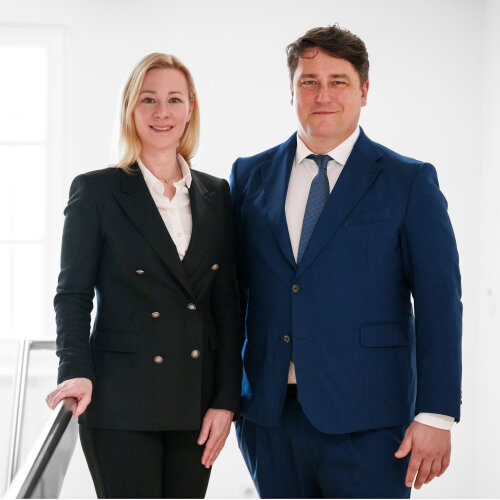Best Collaborative Law Lawyers in Bielefeld
Share your needs with us, get contacted by law firms.
Free. Takes 2 min.
Free Guide to Hiring a Family Lawyer
List of the best lawyers in Bielefeld, Germany
About Collaborative Law in Bielefeld, Germany
Collaborative Law is a method of resolving legal disputes, especially in family law matters such as divorce, separation, and child custody, without resorting to traditional court proceedings. In Bielefeld, Germany, Collaborative Law provides a structured, cooperative approach involving clients and their specially trained lawyers who commit to finding mutually agreeable solutions. The process encourages open communication, transparency, and respectful negotiation, prioritizing the interests of all parties, including children. Collaborative Law in Bielefeld aligns with German legal frameworks, ensuring that agreements reached are legally sound and enforceable.
Why You May Need a Lawyer
There are several situations where seeking legal advice in the field of Collaborative Law is beneficial:
- Divorce or Separation: When couples wish to end their marriage or partnership amicably without going through lengthy court battles.
- Child Custody and Parenting Plans: Parents seeking fair and tailored arrangements for their children’s upbringing.
- Division of Property and Assets: Negotiating equitable distribution of shared property, finances, and debts.
- Spousal or Child Support: Arriving at fair and sustainable financial support agreements.
- Business or Inheritance Disputes: Families or business partners resolving disagreements in a constructive, non-adversarial way.
- Desire for Privacy and Control: Those who want to maintain discretion and influence over the outcome, rather than leaving decisions to a judge.
- Avoiding Court Costs and Delays: Parties looking to reduce legal expenses and resolve matters efficiently.
Local Laws Overview
Collaborative Law in Bielefeld operates under the framework of German civil, family, and procedural law. Germany does not have a separate statutory regulation for Collaborative Law, but the approach leverages relevant provisions in the Bürgerliches Gesetzbuch (BGB - German Civil Code) and Familienverfahrensgesetz (FamFG - Act on Proceedings in Family Matters and in Matters of Non-contentious Jurisdiction). Key aspects include:
- Voluntariness: Participation is voluntary; all parties agree in advance to work toward a negotiated solution without resorting to court litigation.
- Withdrawal Clause: Should the collaborative process fail, typically, the collaborative lawyers withdraw; separate representation is required if the matter goes to court.
- Confidentiality: Discussions and documents remain protected from use in court, promoting openness and honest communication.
- Legal Advice: Each party has their own collaboratively trained lawyer, ensuring fair representation and compliance with legal standards.
- Consideration of Children and Family Interests: Child welfare is a key priority, in line with German family law’s focus on the best interests of the child.
Although collaborative agreements are not automatically enforceable, parties can have their agreement notarized or submit it for judicial approval to gain binding legal force.
Frequently Asked Questions
What is Collaborative Law?
Collaborative Law is a legal procedure where parties resolve disputes out of court with the assistance of legal, and sometimes other professional, support in a cooperative setting.
What types of cases are suitable for Collaborative Law in Bielefeld?
Collaborative Law is most often used in family law matters like divorce, child custody, property division, and support, but can also be applied to inheritance disputes and some business conflicts.
How is Collaborative Law different from mediation?
In mediation, a neutral third party facilitates negotiations without offering legal advice. In Collaborative Law, each party has their own lawyer advocating their interests while still committing to a cooperative process.
Are agreements reached in Collaborative Law binding?
Agreements are not automatically legally binding but can become so if notarized or confirmed by a court, ensuring enforceability.
Do I still need a lawyer if I choose Collaborative Law?
Yes, lawyers are essential in Collaborative Law to ensure your interests are protected and solutions comply with German law.
What happens if we cannot reach an agreement?
If negotiations fail, the collaborative process ends. Typically, parties must hire new legal representation if they decide to proceed to court.
How long does the collaborative process take?
The process often takes less time than traditional litigation, but the duration depends on the complexity of the dispute and the parties’ willingness to cooperate.
Is Collaborative Law more affordable than going to court?
Collaborative Law can be less expensive since it often avoids prolonged court proceedings, but costs vary depending on the number of sessions and professionals involved.
How do I find a collaboratively trained lawyer in Bielefeld?
Look for lawyers specifically trained in Collaborative Law, often listed by local bar associations, legal chambers, or the German Collaborative Law Association (Netzwerk Collaborative Practice Deutschland).
Can Collaborative Law help minimize stress and conflict?
Yes, the process is designed to reduce hostility, encourage problem-solving, and foster long-term cooperation, especially important for disputes involving children or ongoing relationships.
Additional Resources
If you would like to learn more or require further assistance, consider contacting the following organizations or bodies:
- Deutscher Anwaltverein (DAV) - Bielefeld Local Bar Association: Can refer to qualified collaborative lawyers in the area.
- Netzwerk Collaborative Practice Deutschland: A national organization for Collaborative Law professionals and resources.
- Bielefeld Family Court (Familiengericht Bielefeld): For judicial approval of collaborative agreements or more information about legal procedures.
- Volkshochschule Bielefeld (Adult Education Center): Often offers informational seminars on family law and conflict resolution.
- Local Mediation Centers: For complementary mediation services or further guidance.
Next Steps
If you believe Collaborative Law may be the right approach for your situation in Bielefeld, consider the following steps:
- Assess Your Needs: Identify the issues you want to resolve and your priorities.
- Consult a Collaboratively Trained Lawyer: Select a lawyer experienced in Collaborative Law in Bielefeld to discuss your options and their experience with similar cases.
- Contact the Other Party: Approach the other party to gauge their willingness to participate in the collaborative process.
- Agree on the Process: All parties and their lawyers sign a participation agreement outlining the rules and commitments of the collaborative process.
- Engage in Collaborative Sessions: Participate openly in meetings to reach mutually acceptable solutions, possibly with the help of other neutral professionals (e.g., financial advisors, child specialists).
- Finalize the Agreement: Once an understanding is reached, your lawyers can draft a formal agreement. For legal enforceability, have the agreement notarized or submit it to the family court for approval.
- Follow Up: Maintain communication to ensure the agreement works in practice and adjust if necessary.
Seeking professional advice early increases your chances for a smooth, respectful, and satisfactory resolution. Collaborative Law offers a constructive path forward, especially for those prioritizing ongoing relationships and amicable solutions in Bielefeld, Germany.
Lawzana helps you find the best lawyers and law firms in Bielefeld through a curated and pre-screened list of qualified legal professionals. Our platform offers rankings and detailed profiles of attorneys and law firms, allowing you to compare based on practice areas, including Collaborative Law, experience, and client feedback.
Each profile includes a description of the firm's areas of practice, client reviews, team members and partners, year of establishment, spoken languages, office locations, contact information, social media presence, and any published articles or resources. Most firms on our platform speak English and are experienced in both local and international legal matters.
Get a quote from top-rated law firms in Bielefeld, Germany — quickly, securely, and without unnecessary hassle.
Disclaimer:
The information provided on this page is for general informational purposes only and does not constitute legal advice. While we strive to ensure the accuracy and relevance of the content, legal information may change over time, and interpretations of the law can vary. You should always consult with a qualified legal professional for advice specific to your situation.
We disclaim all liability for actions taken or not taken based on the content of this page. If you believe any information is incorrect or outdated, please contact us, and we will review and update it where appropriate.











